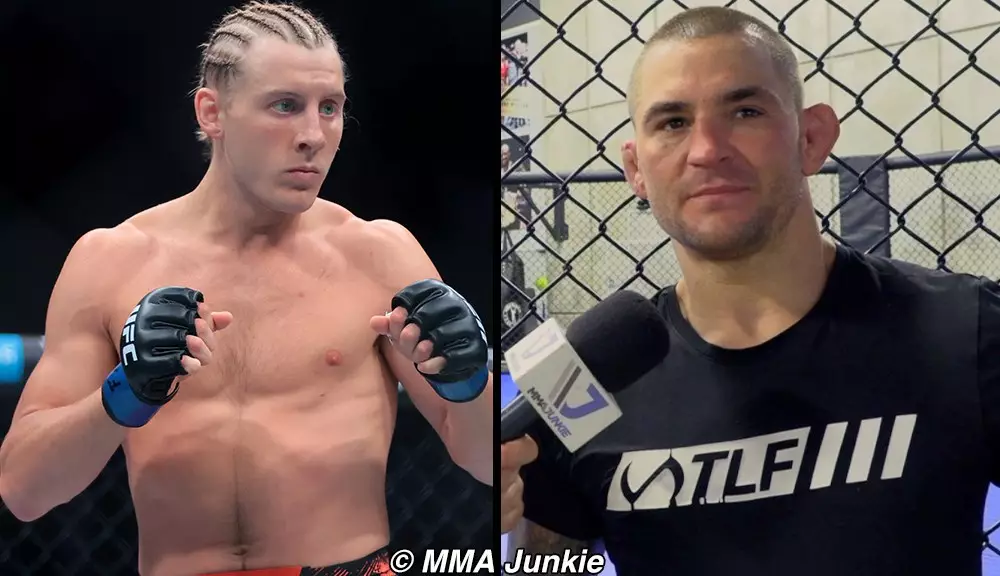In a thrilling bout at UFC 314, Paddy Pimblett showcased his talent and tenacity, making a significant mark in the lightweight division by decisively defeating Michael Chandler. The fight, held at the Kaseya Center in Miami, represented an elevation in competition for Pimblett, who was coming into this matchup with considerable fanfare yet facing skepticism regarding his ability to overcome a seasoned opponent like Chandler. However, he silenced any doubt with a bloody third-round TKO victory that was as impressive as it was dominant, solidifying his status among the elite in the 155-pound category.
Dustin Poirier, former interim champion and now a prominent analyst, weighed in on this monumental fight, expressing admiration for Pimblett’s performance despite a noticeable decline in Chandler’s effectiveness. Poirier pointedly noted that the progression of fighters can sometimes lead to a plateau or decline, highlighting that Chandler, while initially strong in the first round, appeared fatigued and outmatched as the fight unfolded. This observation raises questions not just about Chandler’s future but about how fighters adapt to the relentless pace of competition at the highest level.
Debunking the Myths of Temporary Success
Paddy Pimblett’s triumph is not just a flash in the pan; it’s a clear sign that he is maturing as a fighter, moving from promising prospect to legitimate contender. Poirier emphasized this change, saying, “The guy was a prospect. Now he’s a contender.” This transformation is imperative in mixed martial arts, where a fighter’s early success can sometimes be misleading. Wage a few fights, and the landscape can shift dramatically—Pimblett is navigating this path successfully and doing so with style and substance.
The discussion surrounding Chandler’s performance also begs the question: How much of Pimblett’s win can be attributed to his growth as a fighter versus Chandler’s evident decline? While Poirier rightfully acknowledged that Chandler didn’t appear to be at his best, it’s essential to consider how Pimblett capitalized on those vulnerabilities, adapting to the fight’s rhythm and ultimately controlling the narrative. His ability to shake off an initial setback in the first round and return with a confident onslaught of strikes illustrates a fighter capable of overcoming adversity—a hallmark of champions.
What Lies Ahead for Pimblett
As Poirier rounds out his own career and sets his sights on retirement, discussions around what comes next for Pimblett are gaining traction. He has been described as a “real deal,” and fans and analysts are speculating about future opponents who could elevate him further within the ranks. One compelling suggestion put forth by Poirier is a matchup against Dan Hooker, another formidable fighter who possesses the skill set to test Pimblett’s mettle. The potential clash promises not only an exciting bout but also a significant opportunity for Pimblett to stake his claim as a top-tier fighter in a competitive division.
When pitted against opponents like Hooker or even grapplers like Mateusz Gamrot and Arman Tsarukyan, Pimblett’s versatility and explosive style will be on full display. The lightweight division is famously unforgiving, and a string of solid performances will be required for Pimblett to cement his legacy. Yet, each potential fight carries a narrative that amplifies excitement among fans and creates a burgeoning storyline, reflecting how the UFC utilizes its fighters’ personalities and fighting styles to craft compelling matchups.
The Impact of Personality in the Octagon
Pimblett’s persona has undeniably contributed to his growing fan base, not just his skills in the octagon. His charisma and audacity resonate well beyond the fight itself, making him a compelling figure in MMA’s landscape. This convergence of character and combat sports cultivates a narrative that deepens his connection with fans, which in turn fuels his marketability as a fighter. But it’s crucial that Pimblett continues to back up his bravado with performances that reflect his skill; the pressure to perform well is immense, especially as he faces potential headlining gigs.
The crossroads of remarkable fighting ability and captivating personality is where many champions find their footing, and Josephus “Joe” Pimblett may be on that exact trajectory. As the stakes rise, so too does the scrutiny, and it will be fascinating to observe how he manages the expectation that will accompany his advancement within the competitive league. Only time will reveal whether his current trajectory can sustain its momentum, but one thing is clear: Paddy Pimblett is not just another fighter; he is a burgeoning star ready to claim his space in the lightweight division.

